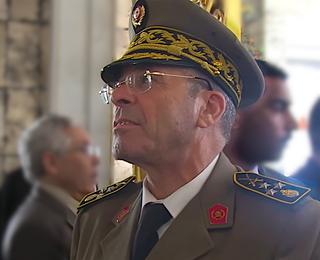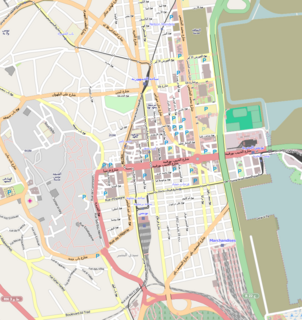Tunisian Presidential Security is the apparatus responsible of the security of the President of Tunisia.
Tunisian Presidential Security is the apparatus responsible of the security of the President of Tunisia.
It is composed of 9,000 members of the police and 12,000 members from the State Security of Tunisia.
General Directors:

Tunisia, officially the Republic of Tunisia, is the northernmost country in Africa. It is a part of the Maghreb region of North Africa, and is bordered by Algeria to the west and southwest, Libya to the southeast, and the Mediterranean Sea to the north and east; covering 163,610 km2 (63,170 sq mi), with a population of 11 million. It contains the eastern end of the Atlas Mountains and the northern reaches of the Sahara desert, with much of its remaining territory arable land. Its 1,300 km (810 mi) of coastline include the African conjunction of the western and eastern parts of the Mediterranean Basin. Tunisia is home to Africa's northernmost point, Cape Angela; and its capital and largest city is Tunis, located on its northeastern coast, which lends the country its name.

The politics of Tunisia takes place within the framework of a unitary semi-presidential representative democratic republic, with a President serving as head of state, Prime Minister as head of government, a unicameral legislature and a court system influenced by French civil law. Between 1956 and 2011, Tunisia operated as a de facto one-party state, with politics dominated by the secular Constitutional Democratic Rally (RCD) under former Presidents Habib Bourguiba and then Zine el Abidine Ben Ali. However, in 2011 a national uprising led to the ousting of the President and the dismantling of the RCD, paving the way for a multi-party democracy. October 2014 saw the first democratic parliamentary elections since the 2011 revolution, resulting in a win by the secularist Nidaa Tounes party with 85 seats in the 217-member assembly.

Zine El Abidine Ben Ali, commonly known as Ben Ali or Ezzine, was a Tunisian politician who served as the 2nd president of Tunisia from 1987 to 2011, where during the Tunisian revolution he fled to Saudi Arabia.

The Democratic Constitutional Rally or Democratic Constitutional Assembly, also referred to by its French initials RCD, formerly called Neo Destour then Socialist Destourian Party, was the ruling party in Tunisia from independence in 1956 until it was overthrown and dissolved in the Tunisian revolution in 2011.

The president of Tunisia, officially the president of the Republic of Tunisia, is the head of state of Tunisia. Tunisia is a semi-presidential republic, whereby the president is the head of state and the prime minister is head of government. Under Article 77 of the Constitution of Tunisia, the president is also the commander-in-chief of the Tunisian Armed Forces. The incumbent president is Kais Saied who has held this position since 23 October 2019 following the death of Beji Caid Essebsi on 25 July 2019.

Ali Fallahian is an Iranian politician and cleric. He served as intelligence minister from 1989 to 1997 under the presidency of Ali Akbar Rafsanjani.
The following is a list of attacks which have been carried out by Al-Qaeda.
In its modern history, Tunisia is a sovereign republic, officially called the Republic of Tunisia. Tunisia has over ten million citizens, almost all of Arab-Berber descent. The Mediterranean Sea is to the north and east, Libya to the southeast, and Algeria to the west. Tunis is the capital and the largest city ; it is located near the ancient site of the city of Carthage.

The Tunisian Revolution, also called the Jasmine Revolution, was an intensive 28-day campaign of civil resistance. It included a series of street demonstrations which took place in Tunisia, and led to the ousting of longtime president Zine El Abidine Ben Ali in January 2011. It eventually led to a thorough democratisation of the country and to free and democratic elections.

Fouad Mebazaa is a Tunisian politician who was the acting president of Tunisia from 15 January 2011 to 13 December 2011. He was active in Neo Destour prior to Tunisian independence, served as Minister of Youth and Sports, Minister of Public Health, and Minister of Culture and Information, and was Speaker of the Chamber of Deputies of Tunisia from 1991 to 2011.

Rachid Ammar, or Rchid Ammar (born 1947 or 1948) was the chief of staff of the Tunisian Armed Forces.

Carthage Palace, is the presidential palace of Tunisia, and the official residence and seat of the President of Tunisia. It is located along the Mediterranean Sea at the current city of Carthage, near the archaeological site of the ancient city, fifteen kilometers from Tunis. A house by Le Corbusier sits within the site.

Mohamed Moncef Marzouki is a Tunisian politician who was an interim president of Tunisia from 2011 to 2014. Through his career he has been a human rights activist, physician and politician. On 12 December 2011, he was chosen as Interim President of Tunisia by the Constituent Assembly.
The international reactions to the Tunisian Revolution were generally supportive of the Tunisian people's right to protest, though several governments continued to voice support for President Zine El Abidine Ben Ali up to and even after his government's largely peaceful overthrow in January 2011.

The Chaambi Operations or Battle of Chaambi is part of the insurgency in the Maghreb (2002–present). In December 2012, the Tunisian Army launched an offensive against the Salafist jihadists in Jebel ech Chambi near Kasserine.

On 24 November 2015, a bus carrying Tunisian presidential guards exploded, killing 12, on a principal road in Tunis, Tunisia. ISIL claimed responsibility for the attack. The bomber, who also died in the attack, was identified as Houssem Abdelli.
The ISIL insurgency in Tunisia refers to the ongoing militant and terror activity of the Islamic State of Iraq and the Levant branch in Tunisia. The activity of the Islamic State of Iraq and the Levant (ISIL) in Tunisia began in June 2015, with the Sousse attacks, though an earlier terror incident in Bardo Museum in March 2015 was claimed by ISIL, while the Tunisian government blamed Okba Ibn Nafaa Brigade for the attack. Following massive border clashes near Ben Guerdane in March 2016, the activity of the ISIL group was described as an armed insurgency, switching from previous tactics of sporadic suicide attacks to attempts to gain territorial control.

Liberalism in Tunisia or Tunisian Liberalism is a school of political ideology that encompasses various political parties in the country.

Socialism in Tunisia or Tunisian socialism is a political philosophy that is shared by various political parties of the country. It has played a role in the country's history from the time of the Tunisian independence movement against France up through the Tunisian Revolution to the present day.
Events in the year 2019 in Tunisia.